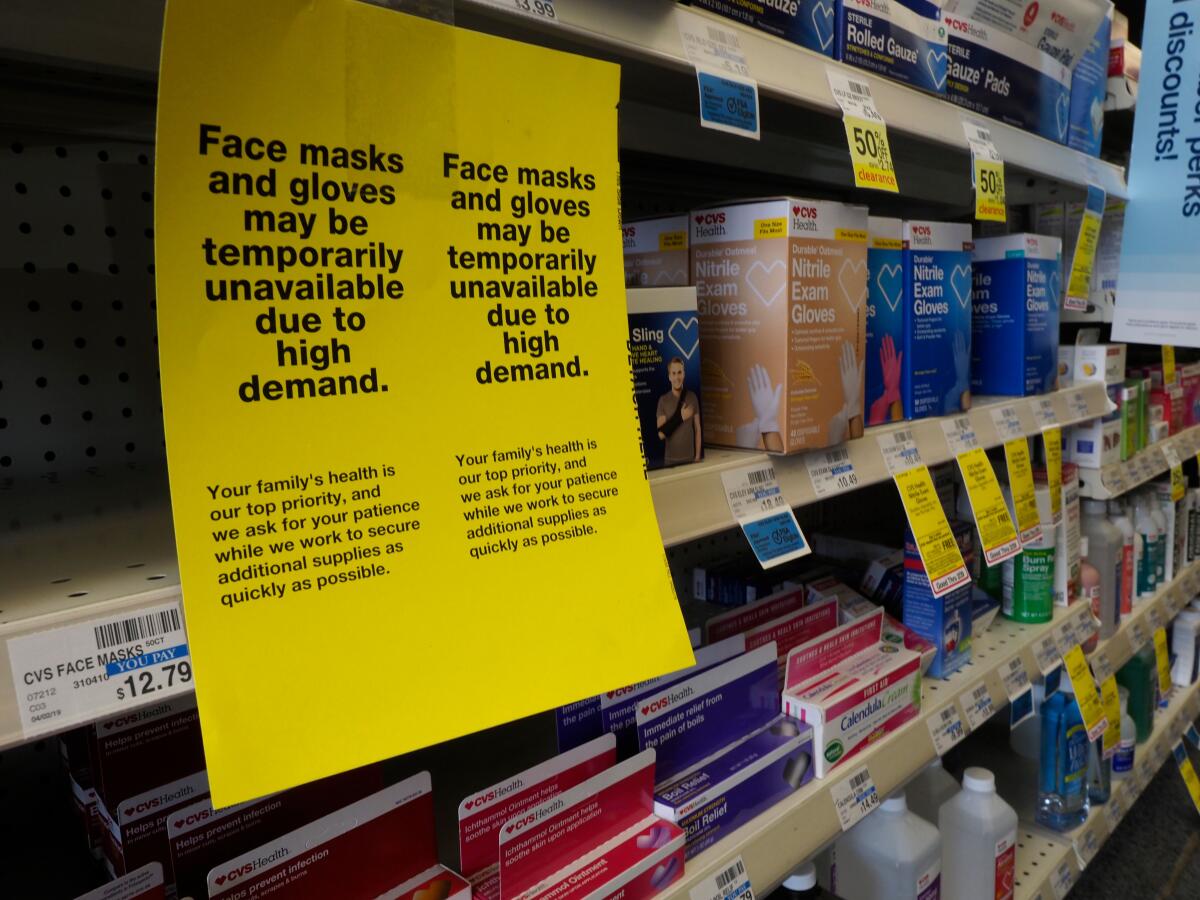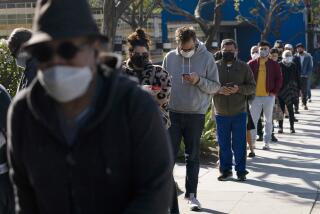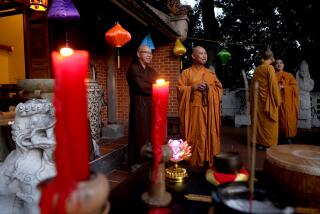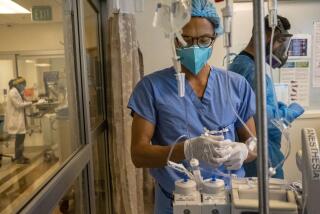Coronavirus spreading in California amid intense fight to slow outbreak

- Share via
DAVIS, Calif. — Northern California has become a focus of efforts to slow the spread of the coronavirus in the U.S. as officials urgently tried to locate people who came in contact with patients in two communities.
Dozens of public health officials have been working in Solano County and nearby Davis, in Yolo County, to find people who crossed paths with a woman believed to be the country’s first novel coronavirus patient who did not recently travel outside the U.S. or come in contact with someone who did.
For the record:
8:04 a.m. Feb. 29, 2020An earlier version of this article mistakenly placed the city of Davis in Sacramento County. It is in Yolo County.
Then on Friday afternoon, Santa Clara County authorities announced a new coronavirus case, that county’s third, also believed to have been spread through community contact. The woman in that case also had no known exposure to the virus through travel or close contact with a known infected person.
“This new case indicates that there is evidence of community transmission but the extent is still not clear,” said Dr. Sara Cody, health officer for Santa Clara County and director of the Santa Clara County Public Health Department. “Now we need to start taking additional actions to slow down the spread of the disease.”
Later Friday, the states of Oregon and Washington also announced new coronavirus cases in people who hadn’t recently traveled overseas or been exposed to other confirmed cases.
In Oregon, an employee of a Washington County elementary school was diagnosed after first experiencing symptoms Feb. 19 and may have exposed others at the school to the virus, officials said.
In Washington, a Snohomish County high school student tested positive after seeking care at Seattle Children’s North Clinic on Feb. 24, officials said. Washington also announced that a King County woman in her 50s who had traveled to South Korea had contracted coronavirus.
Both those patients and the woman in Santa Clara County tested positive for the virus in laboratories in their respective states. They are considered presumptive positive cases until the results are confirmed by CDC testing.
The ongoing efforts in the Davis area had already led to the voluntary quarantining of dozens of people, including workers at the two hospitals where the first woman was treated as well as UC Davis and other college campuses. While no new cases were reported there Friday, health officials said the spread was inevitable.
“Definitely we will have more cases here,” Peter Beilenson, Sacramento County’s director of health services, said. “You shed virus before you are symptomatic so it’s already out of the bag in a lot of ways. It’s going to spread, it’s just going to spread.”
Beilenson said most people who contract the virus — more than 80% — will have mild or no symptoms, but still be able to pass COVID-19 to others.
The Centers for Disease Control and Prevention has sent 10 staffers to work with local and state experts to help trace her contacts, officials said.
“Contact tracing is super important because it can help reduce transmission,” said Dr. Brandon Brown, an associate professor at the UC Riverside School of Medicine’s Center for Healthy Communities. “The worst-case scenario is that outside of close contacts — family, friends and co-workers — there were other people exposed to the virus in places where this person visited.”
Tracing efforts would probably start with the infected patient’s family and co-workers, who would be isolated and tested, and then expand to those who might have come in casual contact with the patient in places the woman visited within the prior two weeks, the timespan believed to be the incubation period of the virus.
Those more casual contacts would likely be watched for signs of illness, then isolated and tested if they develop symptoms.
“It’s a means of surveillance, which is the foundation of modern public health,” Brown said of contact tracing. Because public health officials don’t know how the woman contracted the virus, it’s also likely they’ll perform contact tracing in an attempt to figure out where she got it from, he said.
The woman was hospitalized for three days at NorthBay VacaValley Hospital in Vacaville before being moved to UC Davis Medical Center. She was not immediately tested for several days because she did not fit screening criteria set by the CDC at the time, which include both symptoms of the virus and either a recent history of travel to China or close contact with another coronavirus patient.
This gap concerns officials because it could have allowed her to infect others who came in contact with her.
To identify individuals who came into contact with the woman at the hospital, NorthBay officials sifted through medical records to see which clinicians entered her room. Additionally, three days worth of security footage from 8 p.m. Feb. 15 to mid-morning Feb. 19 were scoured to ensure that all visitors and non-clinicians — such as workers who brought in food trays or refilled bathroom supplies — were tallied.
Sacramento County health officials said dozens of people might be quarantined at home based on having contact with the woman. UC Davis spokesman Steve Telliano disputed information that the number could be higher than 70 but refused to say if more or fewer people were quarantined.
Steve Huddleston, vice president of public affairs of NorthBay Healthcare, said the hospital has a staff of about a couple of hundred and that the quarantine affected dozens connected to the hospital. Those employees who have been home, due to quarantine or unrelated matters, have been backfilled.
Three UC Davis students are under 14-day isolation as one awaits test results after showing mild coronavirus symptoms, officials said Thursday.
The students are roommates at Kearney Hall, UC Davis Chancellor Gary S. May said.
One student has been off campus since Tuesday and has been tested for COVID-19. The student is in isolation at home, UC Davis spokeswoman Melissa Lutz Blouin said Friday.
Just outside the Kearney Hall dorm at UC Davis on Friday, freshman Dominic Alvarez sat on a concrete bench texting friends. He was unfazed about reports of the students potentially exposed to the coronavirus.
Alvarez said some students on campus are panicking unnecessarily, not realizing that the risk of getting seriously ill from the virus is very low.
“Me and friends, we’re not gullible,” said Alvarez, a mechanical engineering student from Los Angeles. “We’re keeping up with the medical news. For young healthy adults with healthy immune systems, it’s just like the flu. Older people have to worry, and younger kids, though.”
Another student parking his bike outside the dorm was more concerned. The student, who asked to be identified only by his nickname “Vac,” was wearing a protective mask over his mouth and nose and black medical gloves on his hands.
“I’m super worried,” said Vac, 21, an environmental engineering student. “We’re in classes every day with other students who may have been exposed.”
Vac is from northern China and has been in constant contact with his family. He says they are fine but that he, along with many other students from all over Asia, are concerned for their loved ones.
“They’re hearing from families and friends who say it’s scary out there, because that’s exactly how it’s been in China and Japan for the past month,” he said.
He’s seen plenty of vitriolic racism against Asians on the internet since the outbreak of the virus, but Vac said he’s not experienced any sort of discrimination at UC Davis.
“We have a pretty strong Asian community on campus,” he said.
On Friday afternoon, Makayla Lara, 20, sipped iced green ice on the porch of a Starbucks that’s a short walk from NorthBay VacaValley Hospital.
“I don’t think people are super freaked out,” said Lara, a nursing student at Solano Community College. “I don’t think it’s anything to be afraid of. Just take like the necessary precautions that you do with any virus. If you are sick, don’t go out. Wash your hands, you know.”
Willon reported from Davis, Chabria from Sacramento, Shalby and Wigglesworth from Los Angeles. Times staff writer Rong-Gong Lin II in San Francisco contributed to this report.
More to Read
Sign up for Essential California
The most important California stories and recommendations in your inbox every morning.
You may occasionally receive promotional content from the Los Angeles Times.














